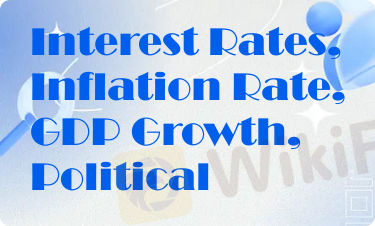
2025-02-12 04:24
業界THE ROLE OF ECONOMIC INDICATORS IN FOREX TRENDS
#firstdealofthenewyearastylz
Economic indicators play a crucial role in shaping forex (foreign exchange) market trends, as they provide insights into a country's economic health and influence investor sentiment. Traders and investors use these indicators to predict currency movements and make informed trading decisions. Below are the key economic indicators and their impact on forex trends:
1. Interest Rates (Central Bank Policies)
Central banks (e.g., the Federal Reserve, European Central Bank) set interest rates, which directly impact currency values.
Higher interest rates attract foreign investment, increasing demand for the currency.
Lower interest rates lead to capital outflows, weakening the currency.
2. Inflation Rate (Consumer Price Index - CPI, Producer Price Index - PPI)
Moderate inflation is positive for a currency, signaling economic stability.
High inflation reduces purchasing power, weakening the currency.
Low inflation/deflation may indicate weak demand and economic slowdown, affecting forex markets negatively.
3. Gross Domestic Product (GDP) Growth
GDP measures overall economic output.
Strong GDP growth boosts currency value as it signals a robust economy.
Weak GDP growth can lead to currency depreciation due to reduced investor confidence.
4. Employment Data (Non-Farm Payrolls - NFP, Unemployment Rate)
A low unemployment rate signals economic strength, attracting investors and strengthening the currency.
A high unemployment rate suggests economic weakness, leading to currency depreciation.
The U.S. NFP report, released monthly, has a major impact on the forex market.
5. Trade Balance (Exports vs. Imports, Current Account)
A trade surplus (exports > imports) strengthens the domestic currency due to higher foreign demand.
A trade deficit (imports > exports) weakens the currency, as more local currency is sold to buy foreign goods.
6. Consumer & Business Confidence (PMI, Retail Sales, Consumer Sentiment)
Purchasing Managers’ Index (PMI): Measures business activity; a reading above 50 indicates economic expansion.
Retail Sales: Strong retail sales suggest consumer confidence and economic growth, supporting currency strength.
Consumer Confidence Index (CCI): Higher confidence boosts spending and currency value.
7. Political and Geopolitical Events
Elections, policy changes, and geopolitical tensions (e.g., wars, trade disputes) can cause forex volatility.
Political stability attracts foreign investment, strengthening the currency.
Uncertainty or crises lead to risk aversion, often strengthening safe-haven currencies like the U.S. dollar (USD), Swiss franc (CHF), and Japanese yen (JPY).
8. Market Sentiment and Speculation
Traders’ expectations based on upcoming data releases can influence forex trends.
Hawkish central bank signals (indicating rate hikes) strengthen a currency, while dovish signals (rate cuts) weaken it.
いいね 0

General Solo
FX会社一覧
人気の話題
業界
米国株式や日経などのクロスボーダー ETF は大量に高値で償還され
業界
包括的なリスク管理計画を策定する
業界
高度なテクノロジーとテクニカル分析を活用する
業界
📢2025年1月9日11:00の通貨ペア
業界
危険】:米国でVarna Tradeを訪問しましたが、オフィスは見つかりませんでした‼ 詳細は下の画
業界
👀#WikiFX 「先週、日本人ユーザーが最も検索されたFX会社が発表されました!」
市場分類

会社ナビ

エキスポ

IB

募集

EA

業界

相場

指標
THE ROLE OF ECONOMIC INDICATORS IN FOREX TRENDS
 香港 | 2025-02-12 04:24
香港 | 2025-02-12 04:24#firstdealofthenewyearastylz
Economic indicators play a crucial role in shaping forex (foreign exchange) market trends, as they provide insights into a country's economic health and influence investor sentiment. Traders and investors use these indicators to predict currency movements and make informed trading decisions. Below are the key economic indicators and their impact on forex trends:
1. Interest Rates (Central Bank Policies)
Central banks (e.g., the Federal Reserve, European Central Bank) set interest rates, which directly impact currency values.
Higher interest rates attract foreign investment, increasing demand for the currency.
Lower interest rates lead to capital outflows, weakening the currency.
2. Inflation Rate (Consumer Price Index - CPI, Producer Price Index - PPI)
Moderate inflation is positive for a currency, signaling economic stability.
High inflation reduces purchasing power, weakening the currency.
Low inflation/deflation may indicate weak demand and economic slowdown, affecting forex markets negatively.
3. Gross Domestic Product (GDP) Growth
GDP measures overall economic output.
Strong GDP growth boosts currency value as it signals a robust economy.
Weak GDP growth can lead to currency depreciation due to reduced investor confidence.
4. Employment Data (Non-Farm Payrolls - NFP, Unemployment Rate)
A low unemployment rate signals economic strength, attracting investors and strengthening the currency.
A high unemployment rate suggests economic weakness, leading to currency depreciation.
The U.S. NFP report, released monthly, has a major impact on the forex market.
5. Trade Balance (Exports vs. Imports, Current Account)
A trade surplus (exports > imports) strengthens the domestic currency due to higher foreign demand.
A trade deficit (imports > exports) weakens the currency, as more local currency is sold to buy foreign goods.
6. Consumer & Business Confidence (PMI, Retail Sales, Consumer Sentiment)
Purchasing Managers’ Index (PMI): Measures business activity; a reading above 50 indicates economic expansion.
Retail Sales: Strong retail sales suggest consumer confidence and economic growth, supporting currency strength.
Consumer Confidence Index (CCI): Higher confidence boosts spending and currency value.
7. Political and Geopolitical Events
Elections, policy changes, and geopolitical tensions (e.g., wars, trade disputes) can cause forex volatility.
Political stability attracts foreign investment, strengthening the currency.
Uncertainty or crises lead to risk aversion, often strengthening safe-haven currencies like the U.S. dollar (USD), Swiss franc (CHF), and Japanese yen (JPY).
8. Market Sentiment and Speculation
Traders’ expectations based on upcoming data releases can influence forex trends.
Hawkish central bank signals (indicating rate hikes) strengthen a currency, while dovish signals (rate cuts) weaken it.
いいね 0
私もコメントします
質問します
0コメント件数

誰もまだコメントしていません、すぐにコメントします

質問します
誰もまだコメントしていません、すぐにコメントします